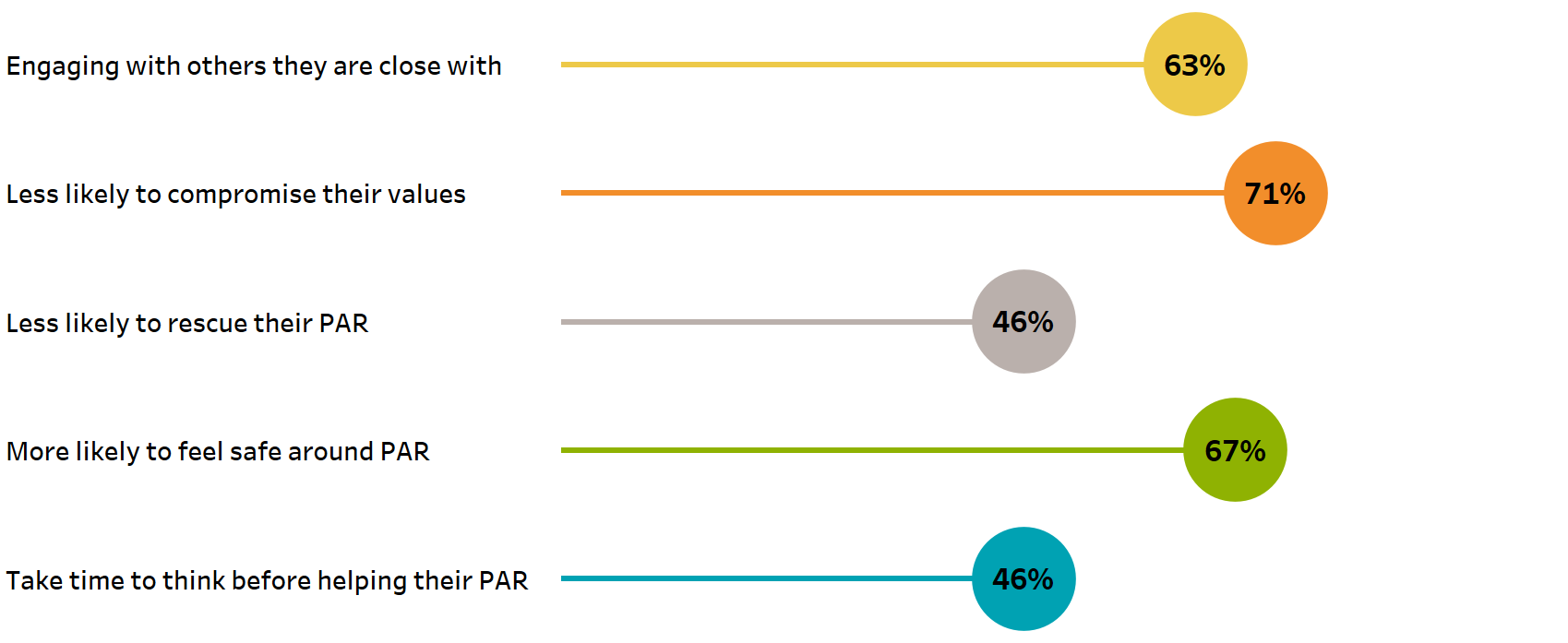Data drop: Loved ones and healthy boundaries
October 17, 2022
This month’s data drop is 92%.
In 2021, Face It TOGETHER developed and began using the Wellness Index (WI). The WI is taken by loved one (LO) members at baseline and every 30 days throughout engagement with a peer coach. Results of their WIs, including measure of change comparing their baseline score to most recent score, are shared with members and used by their coaches in sessions. The WI encompasses eight pillars: self-care, self-change, communication, helpful enabling, healthy boundaries, understanding addiction, self-awareness and compassion fatigue. After 90 days of engagement with a peer coach, 92% of the LOs included in this analysis demonstrated improvements related to setting healthy boundaries.
From Jan. 1, 2021 to May 21, 2022, 74 LO members completed at least one coaching session and a baseline plus at least one follow-up WI. Most of the LO members in this analysis were female (72%) and over the age of 35 (35-44: 15%, 45-54: 30%, 55-64: 20%, >64: 23%).
FIT also gathers information about the person at risk (PAR) that LO members are most concerned about. Their PAR is typically male (66%), less than 45 years old (57%) and is related to the LO as their child (49%) or spouse (23%). Almost half (41%) of LOs have their PAR living with them. This group of LO members stayed engaged with their peer coach for an average 228 days and completed an average 13 coaching sessions.
Of the 74 individuals who were part of this analysis, 81% expressed concerns related to establishing healthy boundaries with their PAR. Out of the eight pillars measured through the WI, issues related to healthy boundaries fall in the middle when it comes to the level of concern at baseline. It is one of the areas in which LO members are able to make significant changes in after participating in peer coaching.
“I needed education on the subject matter of addiction, I needed to understand emotional boundaries, how to help and how not to help in these type of situations… and I needed the help ASAP… Face It TOGETHER provided me with a personal coach who provided me the tools and education that I needed at that moment.”
– LO member
After at least 30 days of peer coaching, 68% improved scores related to establishing healthy boundaries. This continues to increase to 83% after at least 60 days and 92% after at least 90 days. The healthy boundaries pillar focuses on the LO’s tendency to rescue their PAR; feeling safe; compromising values; rushing in to help without considering options; and isolating from people who are important (Figure 1).
At baseline, 68% struggle with rescuing their PAR when they get into trouble and 60% do not feel safe around their PAR. After 90 days of engagement, 46% are less likely to jump in to save their PAR and 67% feel safer. Almost all (83%) indicate at baseline that they are likely to compromise their values and limit time with people who are important to them. After 90 days, 71% are less likely to compromise their values and 63% are engaging with others they are close with. Less than half of the members (43%) struggle with allowing themselves time to think before making a decision related to their PAR, and 46% of those show improvement after 90 days of coaching.

FIT LO peer coaches have personal experience in establishing healthy boundaries with their own PARs. This lived experience allows them to guide LO members in determining what boundaries will be helpful and enforceable. Often, the LO member has attempted to establish unhealthy boundaries that look more like ultimatums, which are intended to control their PAR. Teaching members that boundaries should be beneficial for the member and that they only have the power to break their own set boundary are often key learning opportunities in the coaching room. Changing this mindset can take practice and perseverance, both of which FIT’s LO coaches are there to help them with.
“What I like about the peer-to-peer approach is that I feel like my coach empathizes with my situation as well as offers effective advice. My coach has helped me a lot with establishing boundaries and in fact it has helped me in other areas of my life. To someone considering coaching, I would say it has been a huge help and a relief to have someone in my corner who's unbiased and knowledgeable.” – LO member
